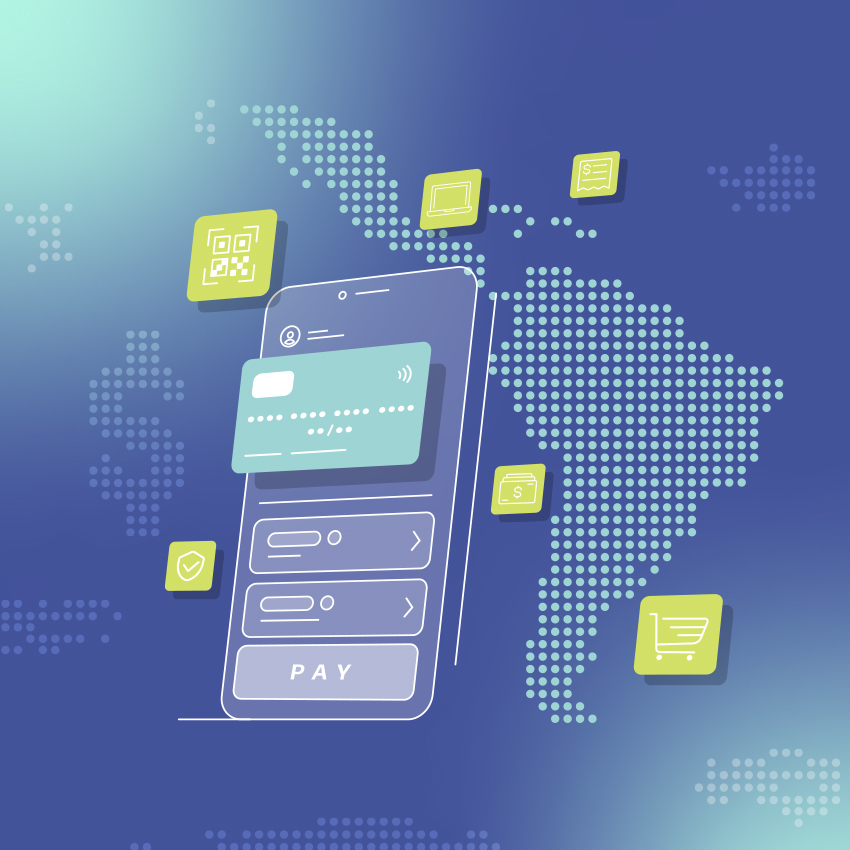It is no longer a trend and it has never been a secret: nowadays, it is possible to buy products and process instant payments anywhere in the world. But, get ahead in the market, it is necessary to anticipate demands and customize solutions.
Therefore, to keep up with current consumer behavior, those who work with online sales must count on a payment solution that includes local payment methods, thus best attending the expectations of today’s consumers. Besides increasing payment options, such a solution should also help your company improve security, speed of transaction, and payment processing involving foreign exchange.
And there’s more! If it is done with the right partner, you can count on smart solutions to avoid risks and increase efficiency.
When choosing a payment solution, merchants often have doubts about whether to count on an international payment gateway, or to use an international payment processor. In order to choose the option that best suits your business, it’s important to understand the difference between them and what to consider when choosing a solution.
With that in mind, we created this article with several valuable tips that will help you adopt the best international payment solution for your company. Do you want to find out more about it? Keep on reading!
International payment processor and international payment gateway: what are the differences?
A payment processor is a financial company authorized to process payment transactions such as cards, wallets, cash payments and bank transfers. An international payment processor processes local payment methods in local currencies for each country you want to sell to and allows merchants to receive the funds in their own currency.
When a customer makes a purchase on an international site, the international payment processor acts as a bridge between customer, merchant and the financial institution involved. The payment processor is responsible for handling merchants’ transactions and making the connection between the acquiring bank and the issuers, according to the payment method selected by the customer. For this, it collects the purchase’s funds and then sends them back to the merchant’s account, in a process called Settlement.
This connection doesn’t refer only to carrying through the payment itself, but also handling all processes required for properly conducting payments online. Thus, it includes anti-fraud verifications and PCI DSS compliance requirements. The international payment processor handles sensitive data from the user, ensuring higher security and less risk for the merchant.
For those who work with online sales, this type of solution is essential to ensure greater speed and reliability in transactions and to support the rising volume of cross-border sales in Latin America. By guaranteeing more security and predictability in investments, the availability of this technology also increases sales and maximize customer conversion and retention.
A payment gateway, on the other hand, connects the online store to credit and debit card operators, handling data transfers, transaction details, and the flow of information between merchant, processor, and consumer. It encrypts data, requests payment processes, and carries through the card purchase.
The main difference, then, is that payment gateways collect and send card data to the payment processor. They are also responsible for informing about payment approval or rejection and processing data through all the involved players.
Payment gateways are an important part of a company’s payment operation, without it the transactions can’t be completed, but a solid payment processor will include the gateway step as part of their complete solution.
Thus, for merchant’s aiming to create a robust, agile, and practical payments experience for their foreign customers, an international payment processor is essential to increase payment options, fully support Latin American sales, and improve payment processing for cross-border purchases.
What should be considered when choosing an international payment processor?
As we’ve seen above, a payment processor is the best choice for merchants that want a complete, robust international payments solution. But how to choose the provider for that important part of your business?
Below, we highlighted the most important aspects and features you should look for in an international payment processor:
The variety of payment methods offered
The first factor to consider when choosing an international payment processor is the functions that are offered. It needs to provide the maximum number of payment methods available in the international market, contemplating the different brands of credit cards, mainly local cards, as well as the use of local e-wallets, instant payments (such as Pix in Brazil, CoDi in Mexico, Yape in Peru, Transfya in Colombia, etc.) and other transfers made through internet banking, for example.
A resource-limited platform can hinder your conversion rates, especially for companies looking to expand their horizons.
In addition, it needs to offer features that ensure adequate support for operations and that provide the best shopping experience to the customer. The modern customer doesn’t want to waste time with time-consuming registrations and complex operations. The simpler and faster the process, the more satisfied they will be, increasing your credibility in the market.
To make the solution even better, how about looking for some differentials? One of them is allowing payment in installments— an important habit of consumers in Latin America. Splitting the payment into, for example, 2 to more than 12 installments is common in countries like Brazil, Argentina, and Mexico.
Studies point to the growth of this payment method as a way for the middle class to increase their purchasing power, especially for higher-priced consumer goods such as cell phones and electronics. Adapting the sale to meet this niche is essential to compete with the local market in these countries.
With BoaCompra, it is possible for the customer to make a purchase as they are used to: splitting the total value into several installments, while the merchant receives the full amount in a single upfront payment, with no extra fees.
The security level
Security is one of the most important requirements when it comes to international payments. Leaked data, fraud and other setbacks can generate serious losses and compromise the credibility of the business.
Thus, a good international payment processor needs to comply with international security standards and ensure PCI DSS compliance, guaranteeing the security of all sensitive data and lessening online fraud risks for the merchant.
This is another advantage of BoaCompra by PagSeguro. With Smart Fraud Prevention technology, every transaction has strong risk prevention. In addition to contacting an issuer for each transaction, some steps make this process safer, including:
- Artificial intelligence: a machine learning that studies around 100 million financial transactions a year and turns them into metrics.
- Scoring: each transaction receives a score that indicates the probability of that transaction to be fraudulent.
- False-positive measuring: rules that can be applied regardless of scoring to ensure full transaction security.
- Data analysis: complete check up of data such as names, card number and IP.
- Personalization: possibility of adapting and customizing rules to specific profiles, according to an alignment with merchants.
In the past, carrying out cross-border transactions was such a complex task that it was practically impossible for merchants. Fortunately, with the improvement of technologies and the evolution of e-commerce, transactions through international payment processors are increasingly simple and secure.
24/7 customer support
Customer support is also an important differentiator of a good international payment processor. Although the flow of operations may be small at first, it is normal for problems to occur, given that there are many variables that need to work at the same time.
In this way, your processor needs to provide support availability, speed in resolving problems, and efficiency to avoid lost sales and ensure consumer satisfaction.
Providing good customer support is essential for customer retention. At BoaCompra, this service is provided 24 hours a day, 7 days a week, in the consumer’s language (in Portuguese, Spanish, English, or Turkish), and through email, chat, and WhatsApp.
According to IBM, 24/7 support, accessible to mobile devices, is one of the main service differentials for 86% of B2B executives. This type of service customizes user preferences, as well as ensuring more security at non-business hours and days.
Transparency and the absence of cross-border surcharges
Pricing and fees are also factors that should be carefully analyzed — and perhaps some of the main concerns. In the case of international transactions, fees can vary widely. The values generally involve a monthly processing fee and FX rates, and some companies charge cross-border surcharges.
This is an extra expense that can be avoided, as there are platforms that do not carry this type of charge. Therefore, carefully calculate the costs and benefits of the solution so as to understand if it is interesting for your company. The right international payment processor will offer technologies capable of revolutionizing the ways of receiving payments in your e-commerce.
It is important to highlight the transparency in this relationship: the merchant knows exactly how much they will receive; and the final customer knows exactly how much he/she will pay.
The variety of integrations
The merchant must, very carefully, evaluate the integrations offered by the international payment processor they are researching. At this stage, it is interesting to analyze the technical possibilities of your team and also the expectations of your customers.
BoaCompra’s solution provides four options of integrations: Direct API, Payment Page, Payment Link, and E-commerce Plugins (which we’ll cover later on), so you can choose the option that best meets your needs.
The e-commerce plugins
Plugins are basically extensions used to assign specific functions to a larger system, in this case, to enable the acceptance of local payments on an e-commerce platform. Thus, a good international payment processor needs to optimize the sales flow and ensure the best payment experience — for both the customer and the merchant.
BoaCompra brings easy-to-install plugins for Magento, WooCommerce and Shopify, the main e-commerce platforms on the market. As a result, integration is easier and more agile for merchants.
The robustness of the solution
The best payment processor needs to be easily integrated anywhere on the web, being compatible with different programming languages and e-commerce systems. The interface still needs to be updated in order to keep up with the card operators’ integration parameters, as well as to guarantee the latest local payment methods in each country. Thus, it provides a constant and stable integration.
If you want to expand your business, BoaCompra by PagSeguro can help you with innovative and safe solutions to take your business to all of Latin America.
Now that you know all about the subject, you can start thinking about increasing your business possibilities with an intelligent platform, increasing the conversion rate and boosting your profits. Get in touch with us and explore our solutions right now:




.jpg)
